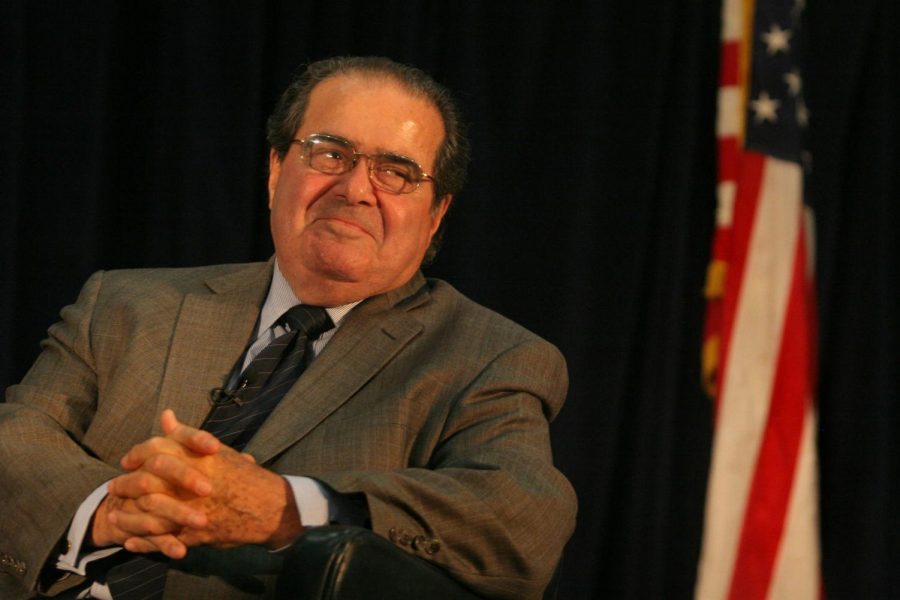Late Justice Scalia had terrible views, was still very human
February 16, 2016
The late Antonin Scalia, now former justice of the U.S. Supreme Court, was a complete scumbag when it came to social progress.
I get it.
I’ve witnessed all across my own Facebook feed and other social media networks as liberals and social justice warriors alike have rejoiced after the man’s death. He did, after all, say some awful things when it came to his pro-life preferences and objection to marriage equality. He shrugged off pro-choice decisions in terms of abortion, and believed that marriage should not be anything other than the union of a man and a woman.
One article from Jezebel, accurately titled “a brief list of some of the Many Terrible Things Antonin Scalia Said and Wrote,” offers what it promises. Here’s a sample on his opinion on women who curse:
“One of the things that upsets me about modern society is the coarseness of manners. You can’t go to a movie—or watch a television show for that matter—without hearing the constant use of the F-word—including, you know, *ladies* using it. People that I know don’t talk like that! But if you portray it a lot, the society’s going to become that way. It’s very sad.”
To Scalia, I have to say … what the hell?
As the article continues toward a solid and well-constructed argument against the terrible things this man said, the author ends with just as strong of a closing statement:
“Everyone deserves to rest in peace, we suppose, but Scalia is certainly not entitled to any special measure of it.”
I only have one question following such an adamant response: What the hell??
Again, I get it—this man appeared to stand against certain human rights and, as a result, human progression in many ways.
In addition, he was apparently quite close with the former George W. Bush administration. Scary stuff.
This man was not what society needs. He was, however, excellent at what he did and a firm believer of his own stances.
Think of it this way:
As much as I disagree with conservative friends, family and colleagues in my own life, it’s important to consider that many of these people grew up in a different time.
Back then, what they knew, loved and believed was the only way to be.
To question otherwise was ludicrous.
Multiply such social pressures over the decades and you may encounter a shell that’s very hard to break.
I feel like this is a harder concept for many of us younger, more “hip” progressives to understand.
It’s why many of us become so frustrated when we see our more conservative counterparts cling on to so many of their arguments without substantiation (see: any useless remark about Bernie Sanders being a “communist”).
It’s why some of us may even refer to more extreme remarks as mentioned from the article above.
Personally, I disagree with everything Scalia stood for, but I’m not going to “celebrate” his death.
I’d rather not celebrate anyone’s death, as it propagates an entire “us vs. them” and “good vs. evil” dichotomy we’re trying to eliminate in our society as it is.
I would rather, instead, consider why others may act or feel as they do and what could be done on a greater social level to cease such hateful speech or antagonistic views.
No, the fact that Scalia was the “best bud” of justice Ruth Ginsburg does not “exempt” him from the status of “Scalia, Dark Knight and Bane of Progress,” but it shouldn’t be our end goal to get excited over anyone’s death. The two still found ways to work together as polar opposites on the political spectrum—that’s still an amazing model we could all (myself included) work on as we continue to develop.
Both are an indication that we, as a society, still have a lot of work to do on so many levels.
Scalia even said following the death of another liberal colleague: “If you can’t disagree ardently with your colleagues about some issues of law and yet personally still be friends, get another job, for Pete’s sake,” according to a Feb. 13 article from the Washington Post.
And you have to admit—if nothing else Scalia did serve well as a functioning caricature of “what not to say or write in positions of power.”
The opinions expressed in Bassinger’s column do not necessarily reflect those of The Daily Barometer staff.















































































































